- Home
- Lynne Olson
Those Angry Days Page 14
Those Angry Days Read online
Page 14
In his memoirs, Biddle noted that FDR never seemed particularly troubled by violations of civil liberties: “It was all very well, he believed, to be liberal, but you must not be soft.” That was especially true in wartime, Biddle observed. “If anything, [Roosevelt] thought rights should yield to the necessities of war. Rights came after victory, not before.”
In his relationship with the Federal Bureau of Investigation and its controversial director, J. Edgar Hoover, the president made that position abundantly clear.
ROOSEVELT’S CLOSE TIES WITH Hoover began in early 1934 when he invited the thirty-nine-year-old director to a meeting at the White House. Hitler had taken power in Germany the year before, and the president asked Hoover to look into “the Nazi movement” in the United States, “especially its antiradical and anti-American activities.” That vague, briefly worded instruction gave Hoover considerable investigative leeway, and he took full advantage of it.
Thanks to the FBI’s use of such questionable methods as wiretapping, break-ins, and bugging, Hoover was already the bane of civil liberties advocates that he would continue to be for the rest of his long career. In response to Roosevelt’s 1934 request, his agents began gathering a voluminous amount of information on what was loosely referred to as the Fascist movement in the United States. It comprised a wide variety of nativist, xenophobic organizations, led by a colorful assortment of right-wing demagogues. Most of the groups were anti-Communist, anti-Roosevelt, and anti-Semitic, with some openly supportive of Hitler and Nazi Germany.
FBI director J. Edgar Hoover shows off his machine-gun prowess to an admirer.
But the FBI chief was much more concerned about what he saw as the Communist threat, and in 1936 he warned Roosevelt of an alleged Communist plot to take over several American labor unions. Again, the president gave him vaguely worded instructions, this time to probe both Fascism and “the general [Communist] movement and its activities as may affect the economic and political life of the country as a whole.” According to Hoover, FDR told him not to make any record of his directive.
As was his wont, Hoover interpreted the president’s imprecise mandate as broadly as possible. By 1939, the Justice Department reported that the FBI had collected “identifying data” on more than ten million persons and had compiled extensive dossiers on those whose beliefs, associations, actions, or ethnic origins seemed suspicious to the FBI or its informants. Included were persons thought to have Nazi, Fascist, or Communist sympathies or who had ties to other countries, including those who subscribed to foreign-language newspapers. Hoover told a congressional committee that he was compiling lists of such people for possible detention “in the event of any greater emergency.”
The FBI’s far-ranging, seemingly uncontrolled investigations and surveillance were increasingly troubling to the ACLU and a scattered number of other civil libertarians, among them several members of Congress. Since the probes were carried out in secret, how could anyone be sure that they were directed only at those who posed a true threat to U.S. security?
In early 1940, Roger Baldwin complained to Robert Jackson that Hoover and the FBI apparently believed they had the authority to investigate any individual or organization they defined as unpatriotic, including pacifists, diplomats, journalists, labor unions, religious groups, and even congressmen. Not long afterward, Senator Theodore Green, a liberal Democrat from Rhode Island, contended that the phones of government officials in his own state, as well as in Pennsylvania and Massachusetts, had been tapped by agents seeking political intelligence. Although Green didn’t identify the offenders, he implied that they were FBI operatives. Green demanded an immediate inquiry by the administration.
The senator’s charges were particularly explosive because wiretapping had been outlawed by Congress in 1934, with the Supreme Court upholding the ban five years later. Nonetheless, the FBI had continued the practice, rationalizing that the law did not mean to ban wiretapping itself but only disclosure of information collected as a result of such taps.
In mid-March, Robert Jackson announced that wiretapping would no longer be allowed under any circumstances unless and until Congress authorized it. Refusing to accept that ruling, Hoover struck back. As was his practice until the end of his career, he had collected considerable political dirt on the administration in power, and now he threatened to use it. He told Adolf Berle, who headed counterespionage activities at the State Department, that for the past few years the FBI had tapped phones at the request of the White House and various senior administration officials, including its most ardent supporter of civil liberties, Harold Ickes. Hoover also maintained that the FBI had actually “done far less actual wire tapping than the Treasury, the SEC, and several of these agencies.” (A curious footnote to this account of Washington wiretapping run amok can be found in an entry from Ickes’s diary in September 1939, in which he noted that FDR had warned cabinet members to “be careful about the telephone” because “some of our wires were being tapped.” The interior secretary included no further details about what, on the surface at least, would appear to have been a startling announcement.)
As it turned out, Hoover had no need to resort to blackmail. He had passed on his concerns about Jackson’s wiretapping ban to the columnists Walter Winchell and Drew Pearson, both of whom wrote pieces and delivered radio broadcasts about how the ban had hampered FBI investigations. According to Pearson, FBI agents had overheard German agents plotting to blow up a British ocean liner but, because of Jackson’s order, were forced to stop listening in to the would-be saboteurs’ phone conversations.
As Hoover was well aware, such stories, true or not, only served to heighten Roosevelt’s worries about internal subversion. On May 21, the president sent Jackson a confidential memo acknowledging that wiretapping was “almost bound to lead to the abuse of civil rights.” Yet, he added, in times of national peril, the government could not sit back and allow foreign agents to work unhindered. Arguing that the Supreme Court surely never intended its decision to “apply to grave matters involving defense of the nation,” FDR ordered Jackson to authorize wiretapping in cases of “suspected subversive activities … including suspected spies.” He suggested that Jackson keep such activities to a minimum and “limit them insofar as possible to aliens.”
Jackson knew that such imprecise and ambiguous instructions would give Hoover and the FBI enormous discretion to tap the phones of whomever they wanted to target, regardless of whether those persons did indeed pose a serious threat to national security. Nonetheless, the attorney general followed Roosevelt’s orders. He was well aware that the president had been openly critical of what he called Jackson’s inflexibility, telling the attorney general’s predecessor, Frank Murphy, that Jackson “did not have the proper sense of balance between civil liberties and national security.” Weary of fighting Roosevelt and knowing that he would not prevail in the argument, Jackson provided little further oversight of the FBI’s surveillance activities.
Until the 1970s, FDR’s directive on wiretapping and Jackson’s compliance with it were used as the legal basis for the thousands of warrantless FBI wiretaps placed during that three-decade period on scores of targets, including embassies, civil rights leaders, political groups, journalists, and government officials. In 1976, a Senate Intelligence Committee report noted that “factors of political belief and association, group membership, and national affiliation became the criteria for intelligence investigations before the war.” The purpose of such investigations, the report added, “was not to assist in the enforcement of criminal laws,” but to provide top administration officials with political information. Such probes, the Senate committee observed, continued throughout World War II and well into the Cold War.
Having acceded to Hoover’s request for wiretapping authority, Roosevelt had a request of his own. Two days after his May 16 address to Congress, Roosevelt handed to his press secretary a stack of more than a hundred telegrams, all of them critical of his speech. Their senders, the pre
sident said, were clearly opposed to a strong national defense, and he wanted Hoover “to go over these, noting the names and addresses” of the people who had dispatched them. Hoover did more than that, checking out each name in FBI files and reporting back to the White House on what he had found. If no information could be located on a critic, the FBI opened a new file.
Not long afterward, another sheaf of negative telegrams was sent to the FBI for investigation. By the end of May, Hoover had run background checks on dozens of critics of Roosevelt’s policies, including Charles Lindbergh, Burton Wheeler, and Gerald Nye. As it turned out, Lindbergh already had a thick FBI file, begun in the mid-1930s after he irritated Hoover by crediting the Treasury Department, rather than the FBI, with solving the kidnapping and murder of his son.
In mid-June 1940, Roosevelt asked an aide to “prepare a nice letter to Edgar Hoover thanking him for all the reports on the investigations he has made and tell him I appreciate the fine job he is doing.”
DURING THESE UNSETTLED, TENSION-FILLED days, the administration targeted yet another outspoken critic of FDR’s policies—Colonel Truman Smith, Lindbergh’s confidant and George Marshall’s chief analyst on Germany. On May 27, Dwight Davis, secretary of war under President Calvin Coolidge, passed on to presidential press secretary Steve Early reports that Smith had helped prepare Lindbergh’s anti-FDR speech the week before and that he was pro-Nazi. Two days later, Lindbergh received a phone call from Smith’s wife, who told him that Marshall had been urged to court-martial her husband because of his antiadministration activities.
There was no question that Smith had been playing with fire for some time. Not only was he openly aligned with Lindbergh, but he also was the chief source on the Army General Staff for the German military attaché, General Friedrich von Boetticher, with whom he had been friends since Smith’s first tour of duty in Germany in the 1920s. (After the war, von Boetticher told U.S. Army interrogators that Smith’s “bitter opposition to Roosevelt and his friendship and admiration for Germany were well known.”)
Repeating Dwight Davis’s accusations, the White House charged Smith with being pro-Nazi, anti-American, and the ghostwriter for Lindbergh’s speeches. The colonel denied all the allegations. About the last one, he would later write: “No human being, as I knew well, could influence Lindbergh on any matter, let alone write his speeches.”
While committed to the subordination of the U.S. military to civilian authority, Marshall strenuously resisted what he saw as a White House attempt to meddle in Army personnel matters. He considered Smith to be an invaluable aide and refused to get rid of him. “Marshall protected Truman at all times,” Albert Wedemeyer, a close friend and colleague of Smith’s, later recalled. Another Marshall protégé, Wedemeyer, a West Point graduate, had recently returned to the United States after spending two years at Germany’s prestigious war college, the Kriegsakademie, in Berlin.
Marshall told Roosevelt that a court-martial of Smith would surely end in an acquittal, not to mention an estrangement between the administration and the Army. Marshall also warned the president that any action taken against Smith would turn him into “an American Dreyfus,” a reference to the French Army officer Alfred Dreyfus, whose trumped-up court-martial in the late 1800s caused an international furor.
Roosevelt backed down, but a flurry of press attacks on Smith prompted Marshall to order the colonel to leave Washington at once and to “stay away until the political heat had cooled.” He also advised Smith to “avoid the appearance of a close relationship” with Lindbergh, at least for a while. For the next two weeks, the colonel and his wife took refuge with Wedemeyer, then a major, who was stationed at Fort Benning, Georgia. Before leaving for Georgia, Smith’s wife warned Lindbergh, as he wrote in his journal, that “the Administration is out to ‘get me.’ ” He noted laconically: “Well, it is not the first time, and it won’t be the last.”
In the midst of this tumult, the Lindberghs were coping with a new barrage of hate mail and crank phone messages. On a lovely evening in early June, Anne Lindbergh received a worried call from her mother. Elizabeth Morrow reported she had just gotten off the phone with an unknown woman, who had asked her: “Aren’t you worried about your daughter?” When Mrs. Morrow asked which daughter the caller was referring to, she replied, “The famous one.”
Anne’s first thought was of her children. When she told Charles about the call, he dismissed it as inconsequential, yet both immediately went to check on their little boys, who were asleep in their bedrooms. Reassured that their sons were safe, the Lindberghs pulled down all the blinds and closed the curtains in their secluded Long Island house. “It’s that awful feeling again,” Anne wrote in her diary that night. “Someone might be watching.”
CHAPTER 8
“THE ART OF MANIPULATION”
Not long after Germany launched its blitzkrieg of Western Europe, a mysterious emissary from the British government arrived in New York. His name was William Stephenson, and his mission was the subject of considerable conjecture.
There were rumors that Stephenson, a forty-three-year-old multimillionaire businessman from Canada, had come to set up a new press and propaganda operation for the British. But that seemed unlikely, since the current government press service, run by Aubrey Morgan and John Wheeler-Bennett and operating from the forty-fourth floor of the RCA building in Rockefeller Center, was, by all accounts, doing a brilliant job in getting the word out to American journalists about Britain’s perilous state and its desperate need for American aid.
In fact, Stephenson had been sent by Winston Churchill to New York as the new head of British intelligence activities in America. On paper, his main job was to protect British munitions purchases from Axis sabotage and to gather information on other enemy operations aimed against Britain. Stephenson’s real mission, however, turned out to be considerably broader. Over the next eighteen months, his operation would declare war on all of Britain’s enemies in the United States—whether German, Italian, Vichy French, or American isolationists. More specifically, he and his colleagues would take whatever steps were necessary to silence those foes and bring America into the war. In doing so, they would pay no heed to questions of legality or morality. As one of Stephenson’s colleagues later remarked, “In modern war … even those belligerents who are hampered by moral scruples must neglect no weapon that may be of service.”
With Britain in such deadly peril, Churchill had no compunction about using what he called “ungentlemanly warfare” to save his country—a stand with which the buccaneering Stephenson fully agreed. Although a businessman, he was no novice in the art of spying.
The son of a poor laborer from western Canada, Stephenson, after completing only six years of school, had been forced to go to work in his early teens. During the Great War, he emigrated to England and ended up a much-decorated war hero, having shot down more than a dozen German planes as a Royal Flying Corps ace. A millionaire before he was thirty, he acquired a score of companies that manufactured everything from cement and aircraft to radio sets and auto bodies, which he ran from an office in central London. On his business travels to Germany in the 1930s, Stephenson discovered that practically all German steel production was being used for the manufacture of armaments and munitions, in violation of the Versailles Treaty. He passed that information on to the British intelligence service (MI6), as well as to Winston Churchill, then a backbencher member of Parliament fighting the appeasement policies of the British government.
Stephenson’s reports greatly impressed Churchill. When he became prime minister in May 1940, he called on the Canadian to undertake this audacious, aggressive covert operation in America, which turned out to be, as the Washington Post columnist David Ignatius later wrote, “a virtual textbook in the art of manipulation.” It was, said British historian Nicholas Cull, “one of the most diverse, extensive … undercover campaigns ever directed by one sovereign state at another.”
With the knowledge of President Roosevelt and
FBI chief J. Edgar Hoover, Stephenson’s unconventional outfit planted propaganda in American newspapers, spied on isolationist groups, dug up political dirt on isolationists in Congress, and forged documents that, when brought to public attention, helped foment anti-Nazi sentiment. “If the isolationists had known the full extent” of the secret alliance between the United States and Britain, “their demands for the impeachment of the President would have been a great deal louder,” noted Robert Sherwood, who, as a member of Roosevelt’s staff, would later serve as a liaison between Stephenson and Roosevelt.
At its height, British Security Coordination, as the organization was blandly named, employed nearly one thousand people at its Rockefeller Center headquarters on Fifth Avenue, across the street from St. Patrick’s Cathedral. Some two thousand additional staffers were stationed in Canada, Central and South America, and the Caribbean.
BSC employees in New York included linguists, cipher and cryptology experts, intelligence agents, propaganda officials, people knowledgeable about business and finance, and specialists in a host of other fields. Among them were the noted Oxford dons Alfred Ayer and Gilbert Highet; the advertising genius David Ogilvy; Eric Maschwitz, who wrote the lyrics for the hit song “A Nightingale Sang in Berkeley Square”; and Noel Langley, coauthor of the screenplay for The Wizard of Oz.
Although a fair number of positions were filled by Britons, the majority of BSC personnel were Canadians, who, because their accents and mannerisms were far closer to those of Americans, were thought to be less conspicuous than their British counterparts. Regardless of their national origin, employees were instructed to draw as little attention to themselves as possible. Female clerical staffers who worked irregular shifts were to tell their landlords and neighbors that they were nurses, which would explain their comings and goings at odd hours. Employees’ apartments were vetted, as were doctors, dentists, and anybody else whose services they might need. They were not to talk about what they did at work, even to BSC colleagues. When they entered an elevator in their office building, they were under orders not to acknowledge any co-workers who might also be on the elevator, even if they had been chatting with each other just moments before.

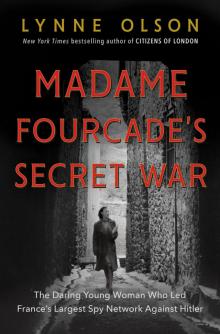 Madame Fourcade's Secret War
Madame Fourcade's Secret War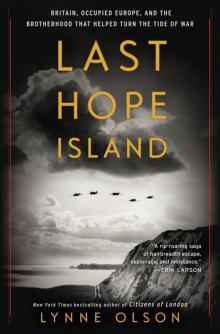 Last Hope Island
Last Hope Island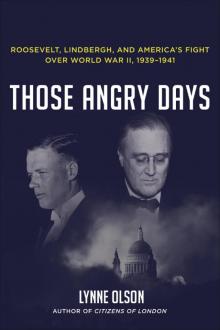 Those Angry Days
Those Angry Days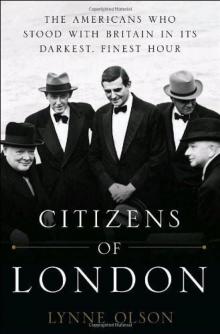 Citizens of London
Citizens of London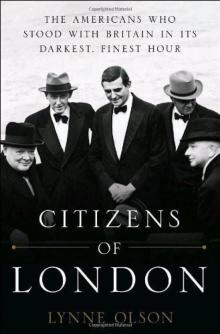 Citizens of London: The Americans Who Stood With Britain in Its Darkest, Finest Hour
Citizens of London: The Americans Who Stood With Britain in Its Darkest, Finest Hour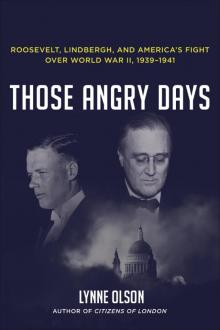 Those Angry Days: Roosevelt, Lindbergh, and America's Fight Over World War II, 1939-1941
Those Angry Days: Roosevelt, Lindbergh, and America's Fight Over World War II, 1939-1941